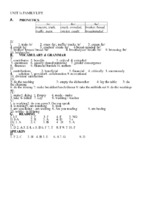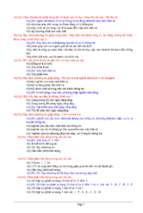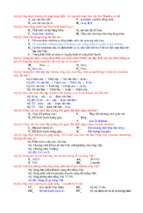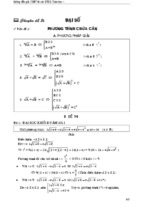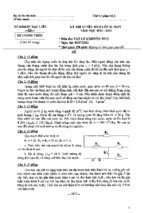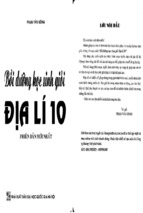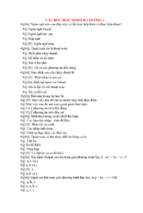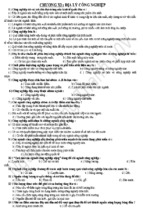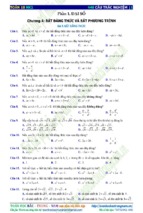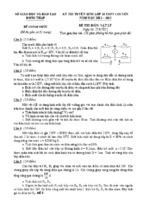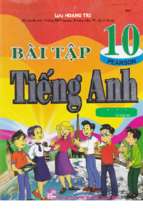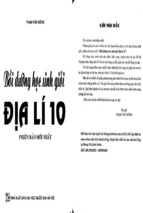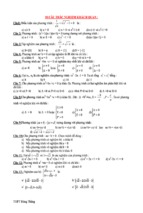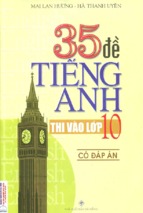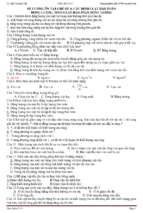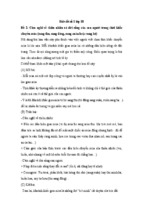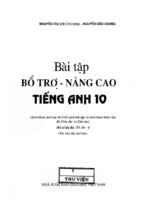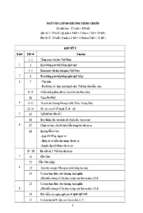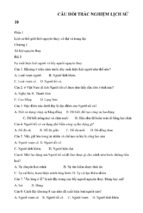Mô tả:
MULTI-CHOICE: (3pts)
I- Choose the word which has the underlined part pronounced differently from the rest. (0.5pt)
1. A. boss B. job C. box D. sport
2. A. four B. your C. pour D. hour
II- Choose the underlined part among A, B,C or D that needs correcting. (0.5pt)
3. How (A)many (B)students (C)there are in (D)your class?
4. (A)After (B)visited my grandmother, I (C)went (D)shopping.
III- Choose A, B, C, or D that best completes each unfinished sentence; best substitutes the underlined part; or has the same meaning to the sentence above. (2pts)
5. She is going to the ……………to borrow some books.
A. school B. library C. shop D. market
6. How many ……………do you study in your class?
A. subjects B. items C. weeks D. students
7. Old people often ……………it difficult to go out without help.
A. find B. finds C. finding D. to find
8. ________ solve this problem?
A. How to B. How I can C. How do you D. How you can
9. Are you satisfied ________ your present work?
A. at B. with C. about D. of
10. ________ do you often go to school? - At 6.30 every morning.
A. How B. What time C. Who D. With whom
11. Mrs. Loan is _________ about her daughter's lateness.
A. worried B. regretted C. thought D. pleased
12. By the time Sheila got back, Chris ...............................
A. have gone B. went C. will go D. had gone
WRITING: (7pts)
IV. Fill each gap with a word from the box. There are more words than needed. (1.5pts)
Watching Thuy taking a (13) ______, one can see how time-consuming the work is. During a maths lesson, she raised (14)_______ arms and opened up her fingers one by one until all (15) ______ stood up. She then (16) ______ the fingers one by one. She continued the demonstration until the children realised they had (17)______ learned how to add and subtract. The children have every reason to be proud (18)______ their efforts. They know a new world is opening up for them.
V-Read the passage, then answer the questions: (2pts)
In Australia, schools for disabled children were begun in the late 1800s by charitable organisations. The government began to provide special schools from the 1920s, but until the 1980s, a system for educating all children, no matter what their disability, was taken on as a government responsibility. Newcastle and Macquarie Universities were two universities which have promoted Early Childhood Intervention from the 1970s until today. Special Education teachers are still trained at those universities. In 1996, a report by David McRae, found that the way children with disabilities had changed very little over the years. He proposed government funding be tied to the children rather than the setting in order to encourage more Special Education.
Questions:
19. When were schools for disabled children begun in Australia?
20. Did the government begin to provide special schools from the 1920s?
21. What did a report by David McRae find?
22. What did David McRae propose government funding be tied to the children rather than the setting for?
VI- Put the verb in the brackets into the correct form (V-ing or to-infinitive). (1.5pts)
23. Cheryl suggested (see) a movie after work.
24. Sandra decided (study) economics in London.
25. Do you mind (help) me translate this letter?
26. If he keeps (come) to work late, he's going to get fired!
27. You seem (be) a little distracted. Is everything alright?
28. They expected (arrive) much earlier, but their plane was delayed in Paris.
VII. Complete the second sentence so that it has a similar meaning to the first. (2pts)
29. Why not go out for dinner?
He suggested…………………………………………………..
30. Avoiding traveling during the rush hour is better.
It is…………………………………………………..
31. Jim passed his driving test. This surprised everybody.
Jim passed ………………………………………………………….
32. My father no longer goes swimming on Sundays.
My father used to……………………………………………………………
ĐÁP ÁN
A- MULTI-CHOICE: (3pts) mỗi câu 0.25đ
1. D. sport 2. D. hour 3. (C)there are 4. (B)visited 5. B. library 6. A. subjects 7. A. find 8. C. How do you 9. B. with 10. Who 11. A. worried 12. D. had gone
B- WRITING: (7pts)
IV 1.5đ, mỗi câu 0.25đ
(13) class (14) both (15) ten (16) closed (17) just (18) of
V-2đ, mỗi câu 0.5đ
19. In Australia, schools for disabled children were begun in the late 1800s.
20. Yes, it did.
21. It found that the way children with disabilities had changed very little over the years.
22. He proposed government funding be tied to the children rather than the setting in order to encourage more Special Education.
VI-1.5đ, mỗi động từ 0.25đ
23. seeing 24. to study 25. helping 26. coming 27. to be 28. to arrive
VII.2đ, mỗi câu 0.5đ
27. He suggested going out for dinner.
28. It is better to avoid traveling during the rush hour.
29. Jim passed his driving test, which surprised everybody.
30. My father used to go swimming on Sundays.

